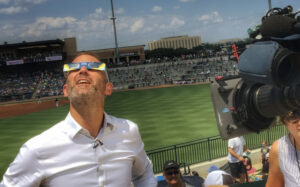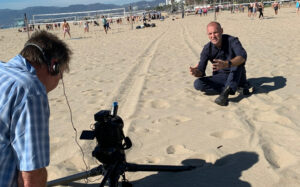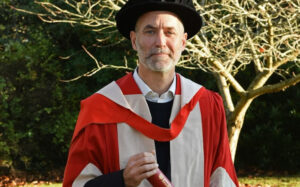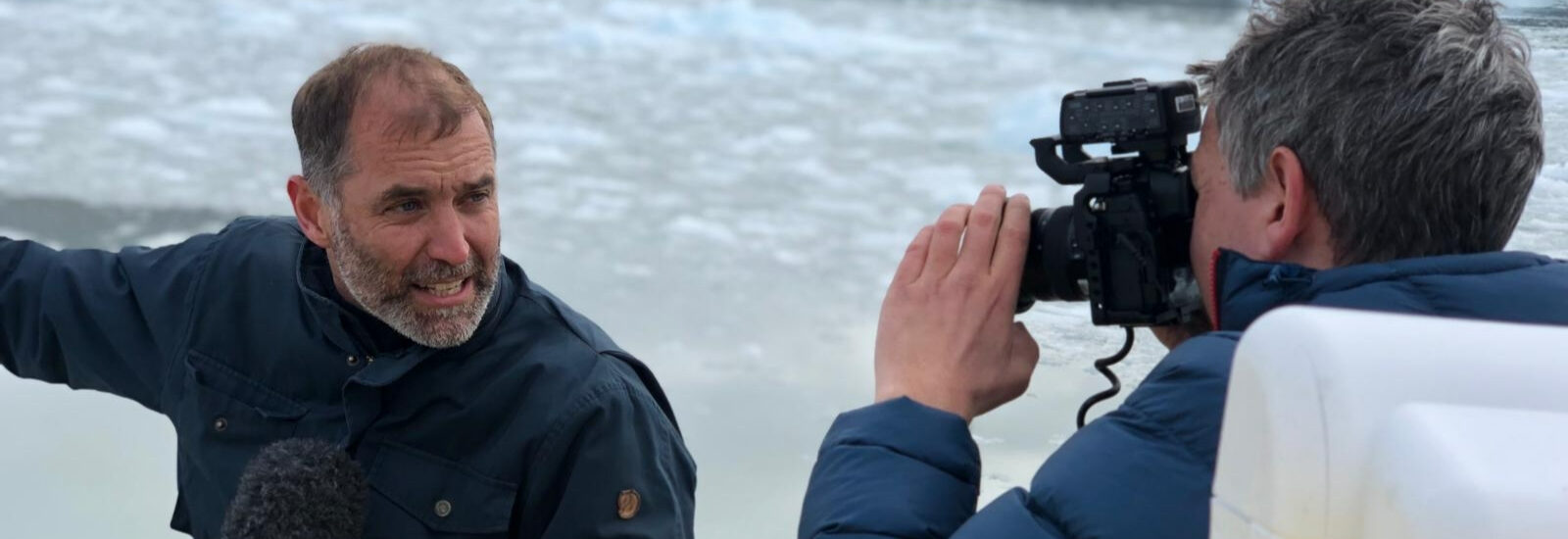Science and Technology Editor for Sky News, alumnus Tom Clarke, has received an honorary degree from the University of Reading for his efforts in communicating complex messages, particularly during the COVID-19 pandemic and on climate change. Tom, who first graduated from the University of Reading with a bachelor’s degree in zoology in 1994, received the Honorary Degree of Doctor of Science in December 2022.
Tom, who first graduated from the University of Reading with a bachelor’s degree in zoology in 1994, received the Honorary Degree of Doctor of Science in December 2022.
Tom has worked in journalism since 2003, starting his career as Science Editor for Channel 4 News, and then ITV News, before moving to Sky News in 2021. During his career he has covered everything from cosmology to medicine, but has specialised in climate change and reporting on diseases including H5N1, SARS, the 2014 Ebola epidemic and, most recently, COVID-19.
Dr Simon Clarke, Associate Professor in microbiology at the University of Reading, and a regular media commentator on COVID-19 and other diseases, said: “During the pandemic, if it were not for skilled science communicators telling the story, the world would have been left dangerously in the dark about what was happening.
“It’s thanks to the efforts of Tom Clarke and his colleagues that people around the world have a better chance of understanding how science is discovering new things and changing the world around us.”
CONNECTED speaks to Tom to find out more about the importance behind his work and to discover the significance of his honorary doctorate.
A responsibility to the public
As Science and Technology Editor for Sky News Tom reports on “anything that can be defined, in the very broadest sense, as science and technology.” That includes medical breakthroughs and failures; space launches and tech companies; biodiversity and climate change, and everything else in-between.
Tom sees his role in communicating to the public as a responsibility – but one that he is proud to carry. He explained: “When I’m reporting a story, it’s my job to tell it well and to communicate complex messages to help the public understand what is going on. With the pandemic, I feel very aware that I have a responsibility to keep the public up-to-date and informed about what is going on in these uncertain times, as well as to hold government and various agencies to account. I’ve never been more aware that I have a real responsibility to do that.”
 Tom also feels that he, along with his team, has a responsibility to keep stories such as the pandemic and climate change, in the news, even though many people feel tired of these somewhat depressing news items.
Tom also feels that he, along with his team, has a responsibility to keep stories such as the pandemic and climate change, in the news, even though many people feel tired of these somewhat depressing news items.
He said: “Infectious diseases was a big area of passion for me, even before the pandemic, and although those of us in the news business are just as tired of COVID-19 as everyone else, I think we’ve got a duty to stay across this important area of science. It’s important we hold politicians and officials to account when it comes to preventing – or at least preparing for – the next pandemic.
“But the one story that has dominated my career has been climate change and the ongoing loss of the planet’s biodiversity. One of the biggest challenges of my job right now is keeping those issues ‘in the news’ given that they are chronic, ongoing and depressingly familiar to viewers and readers. But I’m certainly not going to stop trying.
“And I couldn’t do any of this without a lot of help from some very talented and experienced people: producers, camera operators, and editors who make TV and digital reports succeed.”
A trip down memory lane
 Tom’s efforts in communicating those complex messages around the pandemic and climate change have not gone unnoticed. He shares, “I really can’t tell you how very surprised and honoured I was to be nominated for this doctorate.
Tom’s efforts in communicating those complex messages around the pandemic and climate change have not gone unnoticed. He shares, “I really can’t tell you how very surprised and honoured I was to be nominated for this doctorate.
“I abandoned my PhD in entomology to move into journalism, and while I love my job and am so lucky to have it, part of me has always regretted leaving a career in science behind – being welcomed back as an ‘honorary’ scientist means an awful lot!”
“It wasn’t really until I became a TV science correspondent in the UK that I realised just how many leading academics the University has among its staff. I should stress, being a Reading graduate doesn’t mean I favour the University over others, but it does often happen to have the right experts when I need them.
“I regularly find myself coming back to campus, whether it’s interviewing climate and atmospheric scientists in the Department of Meteorology, or microbiologists about some new pathogen. So for these leading scientists to confer a doctorate honour on me was beyond flattering.”
Tom received his honorary degree in a ceremony on Thursday 8 December 2022 – a day that took him down memory lane. He recalled:
“Graduation day was a wonderful ceremony. To be back in the Great Hall, surrounded by young people starting out in their careers took me back to receiving my bachelor’s degree from Reading so many years ago.
“Once again, I was nervous about tripping over my robes or my hat falling off, but it passed without a hitch. It was a real joy to have lunch with some of the Reading scientists I have worked with as a journalist over the years. But the best part was heading back up to Whiteknights campus with my former tutor, Dr Amanda Callaghan, who taught me so well back in the ‘90s, for a tour of the new Health and Life Sciences building, and of course, her pride and joy – the fantastic Cole Museum of Zoology. I still remember some of the specimens from my undergraduate days!”
Tom hopes this honorary degree will be meaningful beyond a personal level. “While this honorary doctorate is a great personal honour, and a real point of pride for my family, I hope it will also help raise the profile of science communication and scientific literacy outside of academia,” he mused.
“The UK is lucky to have some super talented specialist journalists and policy experts out there. But I believe we could definitely do with more.
“If events like the COVID-19 pandemic and the global environmental catastrophe unfolding around us teaches us anything, it’s that we need people who can understand, question and explain the science underpinning it all.”
Sharing stories with the world
Tom casts his glance to the future and what might be next on his horizon.
He said: “There are great stories to tell around the technologies to address the challenges of climate change or biodiversity loss. We’re entering a new era of space exploration through innovations like the James Webb Space Telescope and manned missions to the Moon and I’m looking forward to these moments defining the next part of my career.
“And of course, a lot of my time is devoted to things happening “on the day”. Breaking news makes life quite unpredictable in terms of where I’m going to be and when, which isn’t great for family or social life, but it’s never boring!
“But I think what I enjoy reporting on the most are the fascinating discoveries of academic scientists in all fields of research that inspire and inform society and generally make our troubled world a more interesting place to be in.”
Find out more about Tom’s work during the pandemic by watching his Alumni Lecture – Asking The Difficult Questions.




